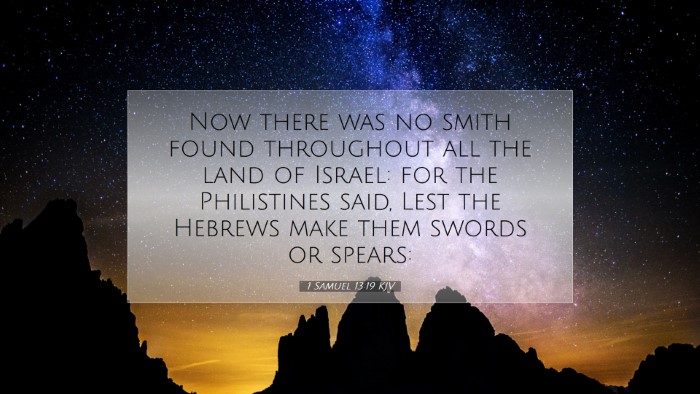Commentary on 1 Samuel 13:19
1 Samuel 13:19 states, "Now there was no blacksmith to be found throughout all the land of Israel, for the Philistines said, 'Lest the Hebrews make swords or spears.' This verse provides critical insight into the socio-political context of ancient Israel during the time of Saul's kingship.
Contextual Background
This passage occurs in a period marked by conflict with the Philistines, who were a dominant neighboring power. The lack of blacksmiths in Israel demonstrates the strategic oppression the Philistines exercised over the Israelites. They sought to limit the Israelites' capacity for military power, essentially disarming them.
Matthew Henry's Insights
According to Matthew Henry, the absence of blacksmiths indicates a severe decline in Israel’s military strength and independence. The Philistines' fear that the Israelites would craft weapons showcases their treatment of Israel as a subject nation.
- Strategic Suppression: The Philistines strategically suppressed Israelite independence by limiting their ability to create weapons. This was indicative of a broader theme in the biblical narrative where external oppression reflects a deeper spiritual state of disobedience or unfaithfulness to God.
- Divine Providence: Matthew Henry suggests that this situation laid the groundwork for expressing God’s sovereignty. Israel’s dependence on God for deliverance would soon become apparent amid military disadvantages.
Albert Barnes’ Exposition
Albert Barnes offers a detailed exposition that underscores the implications of this verse for understanding Israel's vulnerability. The absence of smiths would directly affect the availability of agricultural tools, thereby hindering both economic and military resilience.
- Monopolization of Metalworking: Barnes emphasizes the Philistines' monopolization of the iron industry in the region. This control not only kept weapons out of the hands of the Israelites but also ensured that they were reliant on the Philistines for basic tools and implements.
- Military Implications: The consequences of this situation were dire. Under these restrictive conditions, Israel was poorly equipped to resist Philistine domination, highlighting a critical moment in which Israel's identity as a nation was being shaped by its enemies.
Adam Clarke's Observations
Adam Clarke also delves into the significance of this verse from a historical perspective, noting that the Philistine strategy was to create a dependency that would prolong their control over Israel.
- Historical Context: Clarke notes the archaeological findings that corroborate the historical reality of ironworking being significantly developed in the Philistine territories, contrasting sharply with the limitations placed on the Israelites.
- Moral Lessons: From Clarke’s perspective, this event demonstrates the moral lessons of faith and trust in God. Israel's reliance on human strength became evident as they were confronted by a power that strategically sought to disarm them—in both physical and spiritual senses.
Theological Implications
This text poses significant theological questions about strength, reliance, and the nature of God’s support in times of oppression. Throughout Scripture, there is an evident pattern in which God uses the helpless state of His people as a backdrop for demonstrating His salvation.
- God's Sovereignty: The lack of weapons signifies a moment where human effort is insufficient, leading to divine intervention. It reinforces the theme that God’s power is perfected in weakness (2 Corinthians 12:9).
- IDivine Deliverance: This scenario foreshadows the eventual need for divine deliverance as Israel would later seek God's help in times of dire necessity. His action will reveal the folly of trusting in human means rather than divine providence.
Practical Applications for Today
This passage not only informs our understanding of biblical history but also speaks to contemporary themes of oppression, dependency, and God's power amid weakness. It invites pastors, students, and theologians to reflect on their reliance on God in challenging situations.
- Recognition of Dependence: In light of this commentary, believers are encouraged to recognize their dependence on God rather than solely on human resources or capabilities.
- Faith in Adversity: The reminder that God often works through our weaknesses to demonstrate His strength can foster renewed faith in challenging times, urging believers to seek God fervently when circumstances appear dire.
- Encouragement to Pray: This commentary serves as an encouragement to pray for God's intervention in societal and personal challenges, knowing that He is capable of providing for our needs far beyond human limitations.
Conclusion
1 Samuel 13:19 encapsulates a pivotal moment in the history of Israel—a reminder of the struggles faced by God's people due to external oppression and the ultimate realization that true strength and deliverance come from God alone. Through insights from Matthew Henry, Albert Barnes, and Adam Clarke, we gain a multifaceted understanding of this verse, enriching our theological reflections and encouraging practical applications in our walk of faith.


